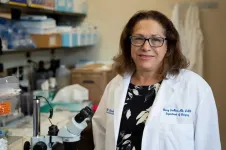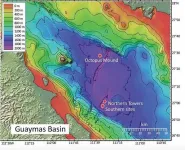(Press-News.org) Machine learning algorithms do a lot for us every day--send unwanted email to our spam folder, warn us if our car is about to back into something, and give us recommendations on what TV show to watch next. Now, we are increasingly using these same algorithms to make environmental predictions for us.
A team of researchers from the University of Minnesota, University of Pittsburgh, and U.S. Geological Survey recently published a END
New machine learning methods could improve environmental predictions
Algorithm is 'taught' rules of the physical world to help researchers make better predictions
2021-06-22
ELSE PRESS RELEASES FROM THIS DATE:
SFRP2 and PD-1 immunotherapy combination halts osteosarcoma metastasis in model
2021-06-22
In a cancer that has not seen new targeted therapies for over 20 years, MUSC Hollings Cancer Center researcher and oncologist Nancy Klauber-DeMore, M.D., is pioneering new discoveries.
Using a combination of personal passion and expertise, Klauber-DeMore shifted her knowledge of the pro-angiogenic protein SFRP2 in breast cancer to address the lack of treatment options for patients with aggressive metastatic osteosarcoma. The results of the combination treatment with SFRP2 and PD-1 antibodies in a preclinical model were published in Cancers.
Osteosarcoma expert William Tap, M.D., chief of the Sarcoma Medical Oncology Service at Memorial Sloan Kettering ...
Asymmetry in CO2 emissions and removals could skew climate targets: SFU research
2021-06-22
Changes in climate resulting from carbon dioxide (CO2) emissions into the Earth's atmosphere are not equal to the climate changes from deliberate CO2 removals--and assuming such a balance could lead to different climate outcomes that may skew climate targets, according to new Simon Fraser University-led research.
"Because of the complexity of the Earth's system, things are not as simple as "one ton of CO2 in, equals one ton of CO2 out," says Kirsten Zickfeld, a distinguished professor of climate science in SFU's Department of Geography, and lead author of a new paper published ...
Pandemic shift to home working could create UK tax crisis
2021-06-22
The shift to home working brought about by the pandemic could cost the UK economy up to £32bn a year in lost personal income tax.
Highly paid workers who live abroad but work in the UK will pay their income tax in their country of residence, rather than to HMRC - which researchers say could cost billions each year.
This new mobility of the workforce can also affect where corporate income tax is paid and value created, as well as VAT and where goods and services are purchased.
Professor Rita de la Feria, Chair in Tax Law in the University of Leeds' School of Law, co-led the new research with Dr Giorgia Maffini, Tax Policy expert, at PWC, ...
It's true: Stress does turn hair gray (and it's reversible)
2021-06-22
Legend has it that Marie Antoinette's hair turned gray overnight just before her beheading in 1791.
Though the legend is inaccurate--hair that has already grown out of the follicle does not change color--a new study from researchers at Columbia University Vagelos College of Physicians and Surgeons is the first to offer quantitative evidence linking psychological stress to graying hair in people.
And while it may seem intuitive that stress can accelerate graying, the researchers were surprised to discover that hair color can be restored when stress is eliminated, a finding that contrasts with a recent study in mice that suggested that stressed-induced gray hairs are permanent.
The ...
Some seafloor microbes can take the heat: And here's what they eat
2021-06-22
WOODS HOLE, Mass. -- It's cold in the depths of the world's oceans; most of the seafloor is at a chilly 4°C. Not so the seafloor of Guaymas Basin in the Gulf of California. Here, tectonic plates drift apart and heat from Earth's interior can rise up -- so far up that it bakes large areas of the seafloor sediments, turning buried organic matter into methane and other energy-rich compounds.
What kinds of organisms thrive in this oceanic hotspot? In two new studies, MBL Assistant Scientist END ...
Investigating a better treatment sequence for esophageal cancer
2021-06-22
Looking for better ways to treat patients with esophageal cancer, University of Colorado Cancer Center member Martin McCarter, MD, is investigating whether a new treatment sequence will result in better outcomes.
As they await the results of a group of clinical trials -- including one at the CU Cancer Center -- McCarter and other University of Colorado researchers (led by surgery resident Bobby Torphy, MD, PhD) looked at data from the National Cancer Database to see if they could identify other patients who have undergone the new sequence, and what the outcomes for those patients were. The group published a paper in the Annals of Surgical Oncology in April ...
Marine sediments explain how part of Brazil's Northeast region became semi-arid
2021-06-22
Rainfall associated with the Intertropical Convergence Zone (ITCZ), the belt of converging trade winds and rising air that encircles the Earth near the Equator, affects the food and water security of approximately 1 billion people worldwide. They include about 11% of the Brazilian population, concentrated in four states of the Northeast region - Rio Grande do Norte, Ceará, Piauí, and Maranhão. Large swathes of these states have a semi-arid climate, and about half of all their annual rainfall occurs in only two months (March and April), when the tropical rain belt reaches its southernmost position, over the north of the Northeast region. During the rest of the year, the tropical ...
Switching from Western diet to a balanced diet may reduce skin, joint inflammation
2021-06-22
(SACRAMENTO, Calif.) -- The secret to healthier skin and joints may reside in gut microorganisms. A study led by UC Davis Health researchers has found that a diet rich in sugar and fat leads to an imbalance in the gut's microbial culture and may contribute to inflammatory skin diseases such as psoriasis. ...
New study: Eating prunes daily improves risk factors for heart disease and inflammation
2021-06-22
New research published in the Journal of Medicinal Food suggests eating prunes each day can improve risk factors for cardiovascular disease (CVD) including raising antioxidant capacity and reducing inflammation among healthy, postmenopausal women.
Cardiovascular disease is the number one cause of death worldwide posing a significant public health challenge.
The research led by San Diego State University reveals that prunes can positively affect heart disease risk.
"When you look at our prior research and the research of others combined with this new data, you'll see consistent ...
Experts highlight solutions to bolster long-term care workforce
2021-06-22
"Workforce issues are the most significant challenges facing the long-term care industry," states the opening editorial of a new special issue of The Gerontologist titled " END ...
LAST 30 PRESS RELEASES:
DEGU debuts with better AI predictions and explanations
‘Giant superatoms’ unlock a new toolbox for quantum computers
Jeonbuk National University researchers explore metal oxide electrodes as a new frontier in electrochemical microplastic detection
Cannabis: What is the profile of adults at low risk of dependence?
Medical and materials innovations of two women engineers recognized by Sony and Nature
Blood test “clocks” predict when Alzheimer’s symptoms will start
Second pregnancy uniquely alters the female brain
Study shows low-field MRI is feasible for breast screening
Nanodevice produces continuous electricity from evaporation
Call me invasive: New evidence confirms the status of the giant Asian mantis in Europe
Scientists discover a key mechanism regulating how oxytocin is released in the mouse brain
Public and patient involvement in research is a balancing act of power
Scientists discover “bacterial constipation,” a new disease caused by gut-drying bacteria
DGIST identifies “magic blueprint” for converting carbon dioxide into resources through atom-level catalyst design
COVID-19 vaccination during pregnancy may help prevent preeclampsia
Menopausal hormone therapy not linked to increased risk of death
Chronic shortage of family doctors in England, reveals BMJ analysis
Booster jabs reduce the risks of COVID-19 deaths, study finds
Screening increases survival rate for stage IV breast cancer by 60%
ACC announces inaugural fellow for the Thad and Gerry Waites Rural Cardiovascular Research Fellowship
University of Oklahoma researchers develop durable hybrid materials for faster radiation detection
Medicaid disenrollment spikes at age 19, study finds
Turning agricultural waste into advanced materials: Review highlights how torrefaction could power a sustainable carbon future
New study warns emerging pollutants in livestock and aquaculture waste may threaten ecosystems and public health
Integrated rice–aquatic farming systems may hold the key to smarter nitrogen use and lower agricultural emissions
Hope for global banana farming in genetic discovery
Mirror image pheromones help beetles swipe right
Prenatal lead exposure related to worse cognitive function in adults
Research alert: Understanding substance use across the full spectrum of sexual identity
Pekingese, Shih Tzu and Staffordshire Bull Terrier among twelve dog breeds at risk of serious breathing condition
[Press-News.org] New machine learning methods could improve environmental predictionsAlgorithm is 'taught' rules of the physical world to help researchers make better predictions



